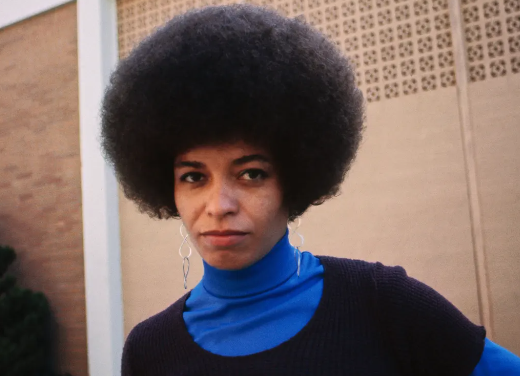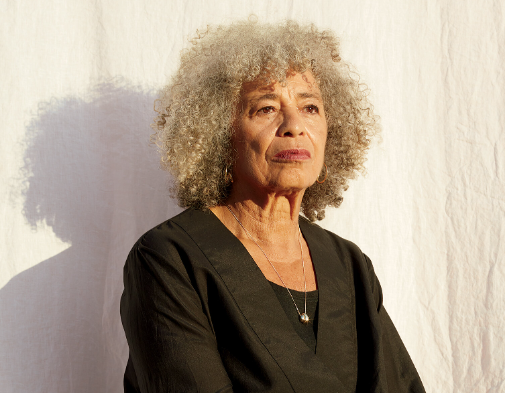Angela Davis Wife: My takeway when I met the activist legend

Angela Davis, an iconic activist and scholar, has made significant contributions to social justice movements throughout her remarkable career. Born on January 26, 1944, in Birmingham, Alabama, Davis became involved in civil rights activism and emerged as a prominent leader in the 1960s and 1970s. Her unwavering commitment to fighting racism, sexism, and capitalism has inspired generations of activists across the globe. With her remarkable intellect, political acumen, and deep empathy for the oppressed, Davis has become a symbol of resistance and an inspiration to many.
- Watch Saltburn Bathtub Scene Video Clip: “Saltburn Bathtub Scene Video Clip” from the dark comedy film “Saltburn.”
- Mujer Se Lanza De La Costa Verde Video:A Tragic Incident on Costa Verde
- Remembering the Life and Legacy of Herb Stewart: A Prominent Businessman and Father to Reality TV Star Morgan Stewart McGraw
- Watch Bernard Elodie Monos Video Viral Original Completo el Twitter
- Unveiling the Mind-Blowing Kelsey Lawrence and Dabb Video on Twitter: A Viral Sensation in Full Glory
Angela Davis: An Iconic Activist and Scholar

Angela Davis is widely recognized as an iconic activist and scholar who has made significant contributions to social justice movements. Throughout her remarkable career, Davis has been a fearless advocate for equality and justice, inspiring generations of activists across the globe. Her unwavering commitment to fighting racism, sexism, and capitalism has made her a symbol of resistance and an inspiration to many.
You are watching: Angela Davis Wife: My takeway when I met the activist legend
Brief overview of Angela Davis as an iconic activist and her influence on social justice movements
Angela Davis’s impact on social justice movements is immeasurable. Born in Birmingham, Alabama, she emerged as a prominent leader in the 1960s and 1970s, fighting for civil rights and challenging systemic oppression. Davis’s intellectual prowess, political acumen, and deep empathy for the oppressed have made her a powerful force for change. Her literary works, such as “Women, Race, and Class” and “Are Prisons Obsolete?”, have shed light on the intersectionality of oppressions and continue to resonate with those striving for a fairer and more inclusive world. Davis’s influence extends beyond academia and activism, as she has consistently used her platform to uplift marginalized communities and advocate for transformative change. Her legacy serves as a testament to the power of activism and the transformative potential of collective struggle.
Controversial Times: The Arrest and Trial
Angela Davis’s involvement in the Soledad Brothers case marked a controversial period in her life. Accused of being connected to the murder of a prison guard, Davis faced intense scrutiny and a highly publicized trial. Despite the immense pressure, she vigorously defended herself and used the platform to expose systematic racism and discrimination within the criminal justice system. Davis’s daring unapologetic stance and powerful oratory skills captivated audiences and fueled a movement demanding justice for black communities. Her arrest and trial became a focal point for discussions about racial discrimination, mass incarceration, and the criminalization of political dissent. The global support she received through the “Free Angela Davis” movement showcased the power of solidarity in the face of injustice and highlighted the interconnectedness of struggles against oppression.
Academic Pursuits and Scholarly Contributions
Angela Davis’s academic journey and scholarly contributions have left an indelible mark on the fields of women’s studies and prison abolition. Her dedication to challenging oppressive systems, along with her intellectual prowess, has empowered generations of scholars and activists to pursue justice and equality. Davis’s work on the intersections of race, gender, and class has shaped critical discourse and inspired countless individuals. Her contributions extend beyond academia, as she continues to be an influential figure, renowned scholar, and revered activist. Angela Davis’s legacy as a scholar and revolutionary remains relevant in our ongoing fight for social change.
The Activist Awakening

Angela Davis’s journey as an activist was shaped by a series of influences and experiences that ignited her passion for social justice. Growing up in the racially segregated neighborhoods of Birmingham, Alabama, Davis witnessed the injustices faced by African Americans firsthand. The constant fear and tension in her community, coupled with the acts of violence and discrimination, fueled her determination to challenge systemic racism.
Influences and Experiences that sparked Angela Davis’ Activism
See more : Mila Amour’s Sensational OnlyFans Leaked Video and Photos Go Viral on Twitter: A Must-Watch!
Angela Davis’s activism was deeply influenced by her parents, who were actively involved in the civil rights movement. Their resilience and commitment to education in the face of adversity inspired Davis to use her voice and knowledge to fight for change. Education became a powerful tool for her, allowing her to critically analyze the societal structures that perpetuated discrimination and marginalization.
During her time at Brandeis University, Davis delved into various ideologies, including Marxism, feminism, and the Black Power movement. These intellectual foundations shaped her understanding of oppression and guided her approach to dismantling oppressive systems.
Involvement in the Civil Rights Movement and the Black Panther Party
Angela Davis’s activism reached new heights when she became involved in the Civil Rights Movement of the 1960s. She actively participated in protests, sit-ins, and demonstrations, advocating for desegregation, voting rights, and an end to racial violence. However, Davis soon realized that achieving racial equality required addressing broader issues such as economic disparities and the discriminatory practices of the criminal justice system.
Inspired by the radical activism of the time, Davis joined the Black Panther Party, a revolutionary organization fighting against racial and economic oppression. As a prominent member, she contributed to community initiatives, such as free breakfast programs for children and healthcare clinics. Davis also played a crucial role in advocating for prisoners’ rights, highlighting the disproportionate incarceration of Black individuals.
Throughout her involvement with the Black Panther Party, Davis encountered surveillance, harassment, and even arrest due to her activism. Her unwavering commitment to justice and equality led to her controversial arrest and trial in 1970, which further fueled her determination to fight for justice.
Angela Davis’s activist awakening was a result of her experiences with racial discrimination, her intellectual exploration of various ideologies, and her involvement in the Civil Rights Movement and the Black Panther Party. Her journey as an activist continues to inspire individuals to challenge oppressive systems and strive for a more just and equitable society.
Early Life and Education
Childhood and upbringing in segregated Birmingham, Alabama
See more : Exclusive Peek: Unseen Mila Amour Leaked OnlyFans Video Goes Viral on Reddit and Twitter!
Angela Davis’s early life was shaped by the racially segregated environment of Birmingham, Alabama. Growing up in a community deeply impacted by racial injustice, Davis witnessed the struggles and challenges faced by African Americans on a daily basis. Birmingham, often referred to as “Bombingham” due to the numerous racially motivated bombings, was a hotbed of civil rights activism. The constant fear and tension in the city left a lasting impression on Davis, fueling her determination to fight against systemic racism.
Educational background and early academic achievements
Despite the challenging circumstances, Angela Davis showed exceptional academic promise from an early age. Recognizing her potential, Davis’s parents encouraged her to pursue education as a means to challenge racial inequality. She attended Parker High School, a segregated institution that provided limited resources and opportunities for African American students. However, Davis’s thirst for knowledge and passion for social justice propelled her to excel academically.
Her remarkable dedication and academic achievements earned her a scholarship to attend Brandeis University in Massachusetts. At Brandeis, Davis broadened her understanding of social inequality, studying various subjects such as philosophy, Marxism, and literature. Influential professors, such as Herbert Marcuse, greatly inspired her intellectual growth and activism. Davis also engaged in extracurricular activities, joining student organizations focused on racial justice and human rights. She became a vocal advocate for civil rights, using her platform to raise awareness about the plight of African Americans in the United States.
After completing her undergraduate studies, Angela Davis pursued a master’s degree in philosophy at the University of California, San Diego. During this time, she fully immersed herself in the intellectual and political climate of the era, participating in protests and demonstrations advocating for racial justice and opposing the Vietnam War.
Angela Davis’s early life and educational background provided a fertile ground for her activist endeavors. Her upbringing in segregated Birmingham, Alabama, and her academic achievements shaped her into a fearless advocate for social justice. Angela Davis’s remarkable journey continues to inspire generations striving for a fairer and more inclusive society.
In conclusion, Angela Davis is an iconic activist whose contributions to social justice movements are immeasurable. Her fearless pursuit of equality and justice has inspired countless individuals to take a stand against systemic oppression and fight for a better world. Davis’s intellectual prowess, unwavering dedication, and resilience continue to resonate with activists and scholars today. By shining a light on the interconnectedness of oppressions, Angela Davis has played an integral role in mobilizing diverse movements and spearheading progressive change globally. Her legacy serves as a testament to the power of activism and the transformative potential of collective struggle. Angela Davis’s journey is a reminder that the fight for justice is ongoing and that we must continue to challenge oppressive systems and work towards a fairer and more inclusive society.
Source: https://cupstograms.net
Category: Trending


